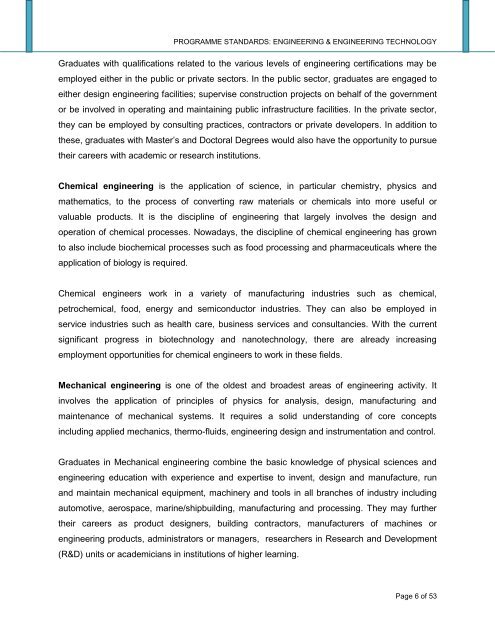PROGRAMME STANDARDS: ENGINEERING ... - DrJJ
PROGRAMME STANDARDS: ENGINEERING ... - DrJJ
PROGRAMME STANDARDS: ENGINEERING ... - DrJJ
Create successful ePaper yourself
Turn your PDF publications into a flip-book with our unique Google optimized e-Paper software.
<strong>PROGRAMME</strong> <strong>STANDARDS</strong>: <strong>ENGINEERING</strong> & <strong>ENGINEERING</strong> TECHNOLOGY<br />
Graduates with qualifications related to the various levels of engineering certifications may be<br />
employed either in the public or private sectors. In the public sector, graduates are engaged to<br />
either design engineering facilities; supervise construction projects on behalf of the government<br />
or be involved in operating and maintaining public infrastructure facilities. In the private sector,<br />
they can be employed by consulting practices, contractors or private developers. In addition to<br />
these, graduates with Master‟s and Doctoral Degrees would also have the opportunity to pursue<br />
their careers with academic or research institutions.<br />
Chemical engineering is the application of science, in particular chemistry, physics and<br />
mathematics, to the process of converting raw materials or chemicals into more useful or<br />
valuable products. It is the discipline of engineering that largely involves the design and<br />
operation of chemical processes. Nowadays, the discipline of chemical engineering has grown<br />
to also include biochemical processes such as food processing and pharmaceuticals where the<br />
application of biology is required.<br />
Chemical engineers work in a variety of manufacturing industries such as chemical,<br />
petrochemical, food, energy and semiconductor industries. They can also be employed in<br />
service industries such as health care, business services and consultancies. With the current<br />
significant progress in biotechnology and nanotechnology, there are already increasing<br />
employment opportunities for chemical engineers to work in these fields.<br />
Mechanical engineering is one of the oldest and broadest areas of engineering activity. It<br />
involves the application of principles of physics for analysis, design, manufacturing and<br />
maintenance of mechanical systems. It requires a solid understanding of core concepts<br />
including applied mechanics, thermo-fluids, engineering design and instrumentation and control.<br />
Graduates in Mechanical engineering combine the basic knowledge of physical sciences and<br />
engineering education with experience and expertise to invent, design and manufacture, run<br />
and maintain mechanical equipment, machinery and tools in all branches of industry including<br />
automotive, aerospace, marine/shipbuilding, manufacturing and processing. They may further<br />
their careers as product designers, building contractors, manufacturers of machines or<br />
engineering products, administrators or managers, researchers in Research and Development<br />
(R&D) units or academicians in institutions of higher learning.<br />
Page 6 of 53









